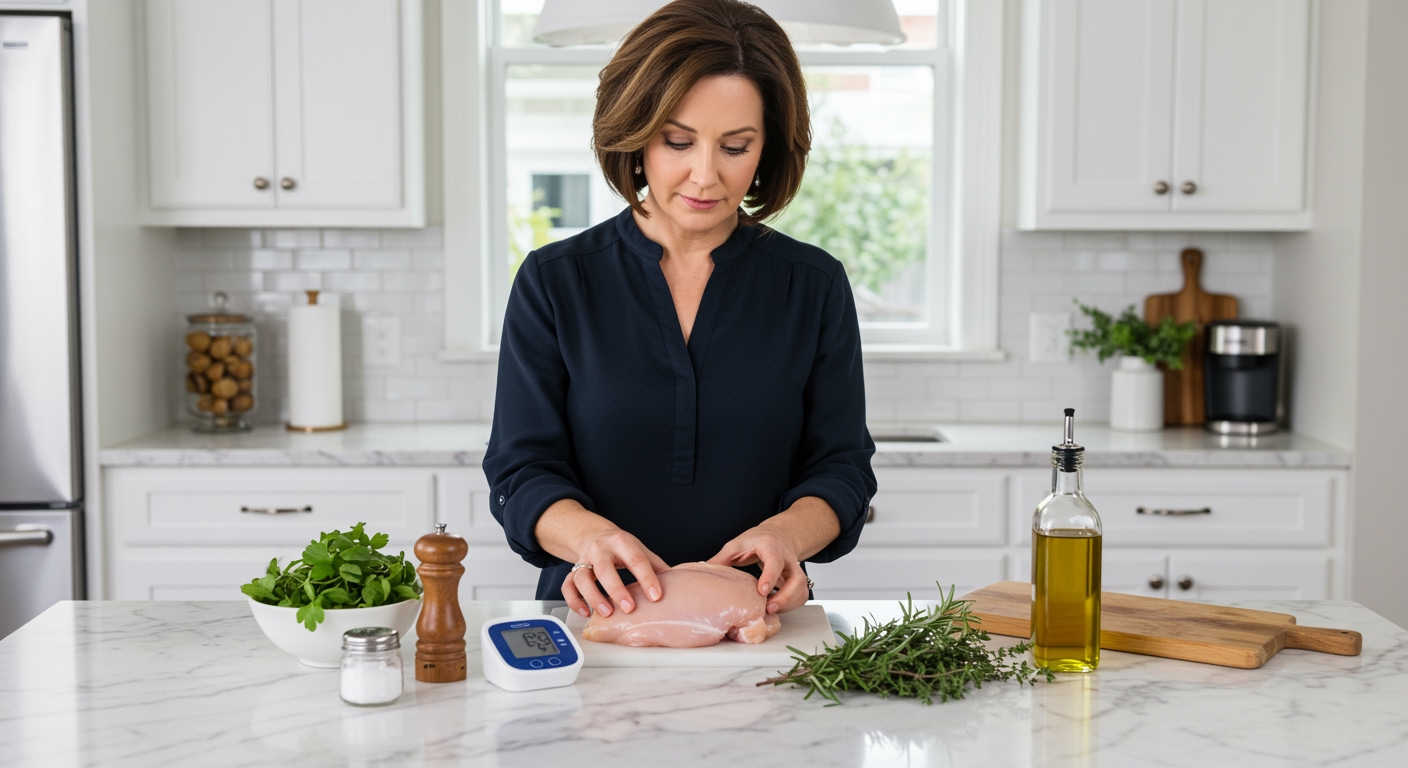✪ Key Takeaway: Chicken breast is safe for hypertensive patients when prepared without excess sodium and cooked using healthy methods.
Introduction
Your doctor just told you that your blood pressure is too high and you need to change your diet immediately.
Now you are standing in the grocery store wondering if that chicken breast in your cart will help or hurt your blood pressure goals.
Hi, I am Abdur, your nutrition coach and today I am going to explain exactly how chicken breast affects your blood pressure and what you need to know to make it work for your health.
Does Chicken Breast Naturally Raise Blood Pressure?
Plain chicken breast does not naturally raise your blood pressure.
In fact, lean protein like chicken breast can actually support healthy blood pressure levels when it replaces processed meats in your diet.
A 100-gram serving of skinless chicken breast contains only about 74 milligrams of sodium naturally.
This amount is considered very low compared to the 2300 milligrams daily limit recommended for people with high blood pressure.
The high-quality protein in chicken breast helps your body maintain healthy blood vessels and supports proper kidney function.
Your kidneys play a crucial role in blood pressure regulation by controlling fluid balance and filtering waste from your blood.
Research shows that people who eat adequate amounts of lean protein tend to have better blood pressure control than those who rely heavily on refined carbohydrates.
✪ Fact: Chicken breast contains all nine essential amino acids your body needs for optimal cardiovascular health.
What Cooking Methods Make Chicken Breast Unsafe?
The way you prepare chicken breast determines whether it helps or harms your blood pressure.
Deep frying chicken breast adds unnecessary calories and unhealthy trans fats that can worsen hypertension over time.
When you bread and fry chicken, you often add significant amounts of sodium through seasoning mixes and processed coatings.
Many commercial chicken preparations contain hidden sodium sources like monosodium glutamate, sodium phosphates, and salt-based flavor enhancers.
Marinating chicken in high-sodium sauces like teriyaki, barbecue, or Italian dressing can turn healthy protein into a blood pressure nightmare.
Some store-bought marinades contain over 400 milligrams of sodium per tablespoon.
The safest cooking methods include grilling, baking, poaching, or steaming with herbs and spices instead of salt-based seasonings.
✪ Pro Tip: Use lemon juice, garlic, and fresh herbs to add flavor without increasing sodium content.
How Much Chicken Breast Should You Eat Daily?
Most hypertensive patients can safely eat 3 to 4 ounces of chicken breast per day as part of a balanced diet.
This portion size provides approximately 25 grams of high-quality protein without overloading your system with calories.
Your body can only use about 20 to 30 grams of protein effectively at one time for muscle maintenance and repair.
Eating larger portions does not provide additional benefits and may stress your kidneys if you have existing kidney problems related to high blood pressure.
The key is to balance your protein intake throughout the day rather than consuming large amounts in one meal.
Consider pairing your chicken breast with potassium-rich vegetables like spinach, broccoli, or sweet potatoes to enhance blood pressure benefits.
Potassium helps counteract the effects of sodium and supports healthy blood vessel function.
✪ Note: A palm-sized portion of chicken breast is roughly equivalent to 3-4 ounces for most adults.
Should You Choose Organic or Conventional Chicken?
Both organic and conventional chicken breast are safe choices for people with high blood pressure.
The main difference lies in farming practices rather than nutritional content that directly affects blood pressure.
Conventional chicken may contain trace amounts of antibiotics, but these levels are regulated and considered safe by food safety authorities.
Organic chicken is raised without antibiotics or synthetic pesticides, which some people prefer for environmental and personal health reasons.
From a blood pressure perspective, the most important factor is avoiding enhanced or injected chicken products.
These products are injected with sodium-based solutions to improve flavor and moisture retention.
Always read labels carefully and choose chicken breast that lists only chicken in the ingredients without added sodium solutions or flavor enhancers.
✪ Pro Tip: Look for chicken labeled as “all natural” or “minimally processed” to avoid hidden sodium additives.
Can Chicken Breast Replace Blood Pressure Medications?
Chicken breast cannot replace blood pressure medications, but it can support your overall treatment plan.
Dietary changes work best when combined with prescribed medications and other lifestyle modifications.
The protein in chicken breast helps maintain stable blood sugar levels, which indirectly supports healthy blood pressure.
When your blood sugar spikes and crashes frequently, it can trigger stress responses that temporarily raise your blood pressure.
Steady protein intake from sources like chicken breast helps prevent these blood sugar fluctuations.
Some studies suggest that people who follow heart-healthy diets rich in lean proteins may eventually need lower doses of blood pressure medications.
However, you should never adjust your medication dosage without consulting your healthcare provider first.
✪ Note: Always discuss dietary changes with your doctor, especially if you take blood pressure medications.
The Bottom Line
Chicken breast is not only safe for hypertensive patients but can actually support your blood pressure management goals when prepared correctly.
The healthiest foods become unhealthy when we prepare them poorly, and the key to success lies in keeping things simple and natural.
I would love to hear about your experience with chicken breast and blood pressure management, so please share your questions or thoughts in the comments below.
References
At NutritionCrown, we use quality and credible sources to ensure our content is accurate and trustworthy. Below are the sources referenced in creating this article:
- PMC: Dietary Approaches to Stop Hypertension
- Health Central: Foods to Avoid with High Blood Pressure
- Healthline: Foods for High Blood Pressure
- GI Care: High Blood Pressure Diet





